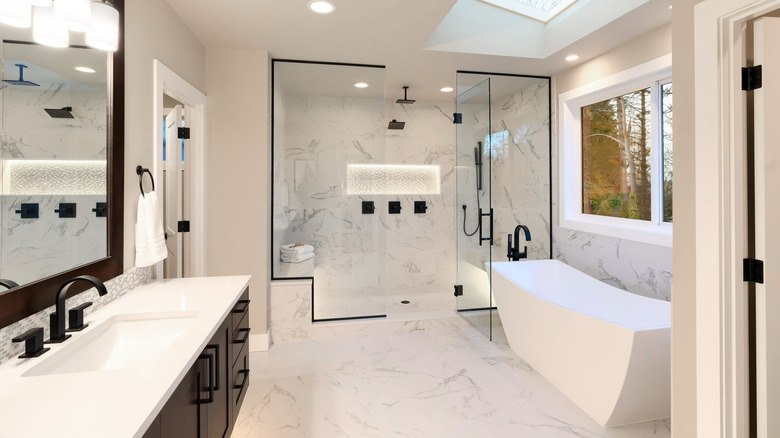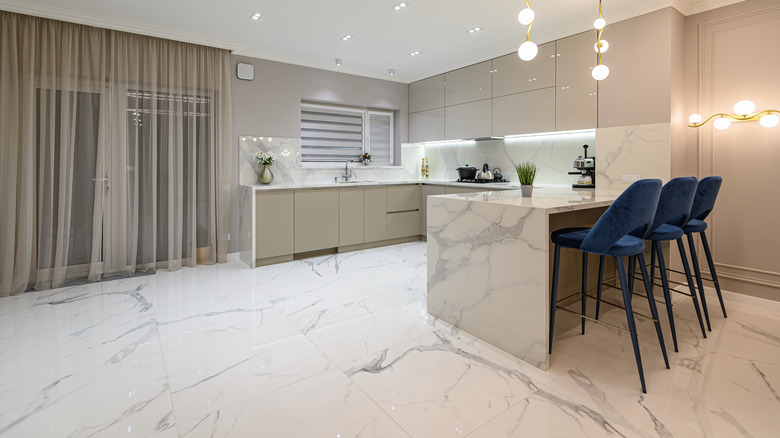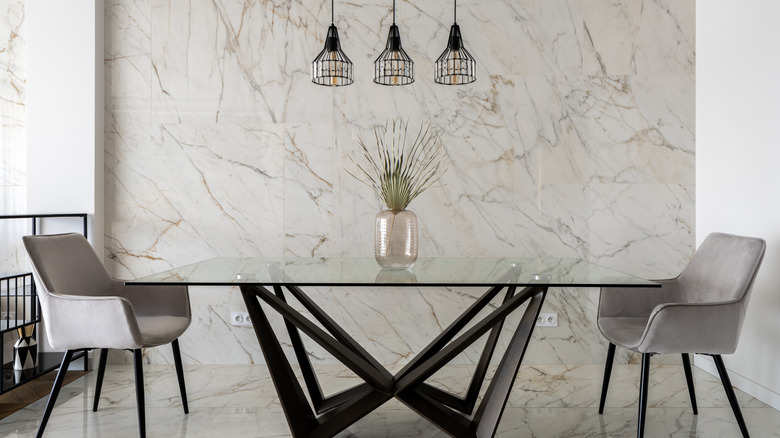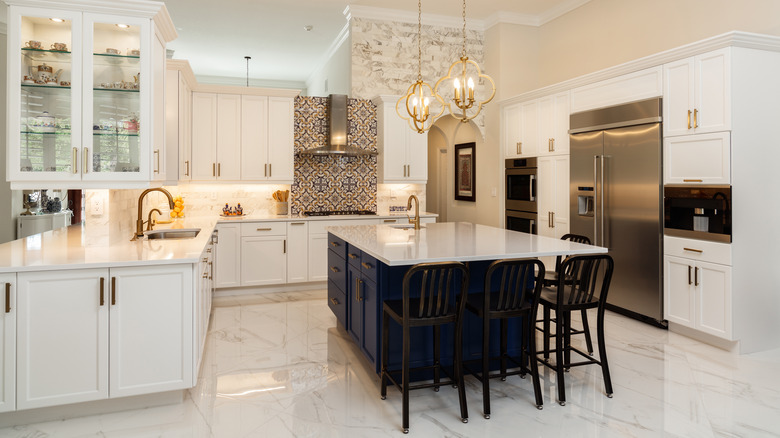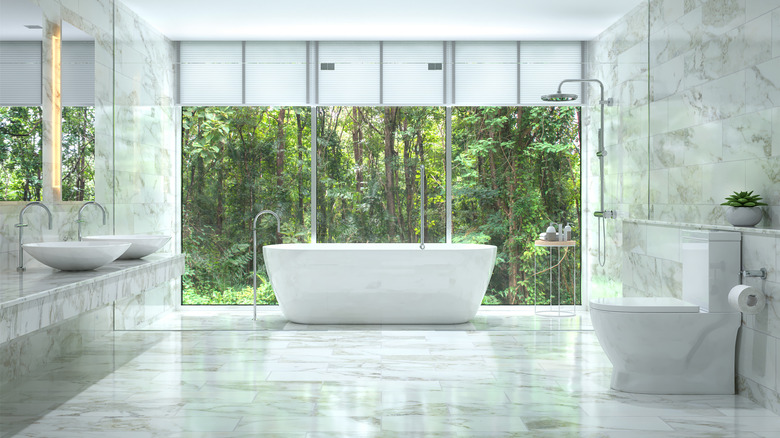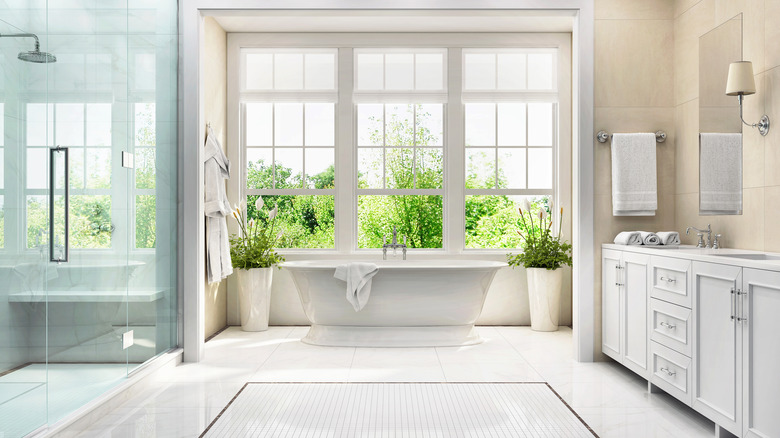The Pros And Cons Of Marble Flooring
Few other flooring options exude the luxury and exuberance that marble does. Marble is most commonly found as a white stone with light gray veining, though there are plenty of color variations. According to Let's Get Stone'd, this impressive stone starts off its life cycle as limestone, but through prolonged and intense heat and pressure, it becomes the metamorphic rock we know as marble.
Mineral deposits cause the veins that make marble so visually striking, and the unique thing about authentic marble is that no rock is made the same. The veining can be large and dramatic swirls, or thin lines, entirely depending on how the minerals are distributed. As a result, marble is an incredibly beloved material throughout history, with some of the most imposing creations where it was used being the Taj Mahal, the Colosseum, and the Washington monument, Chamunda Stones notes. They were also carved into famous statues like Michelangelo's David and Pietà (via ArtRadarJournal).
Marble is a gorgeous, versatile rock, but it isn't impervious to flaws. While makes for a stunning addition to any home, it comes at a cost, both in terms of maintenance and actual money. There is a host of advantages and disadvantages to having marble floors in your home, so keep reading to find more.
Pro: one of a kind design
One of the biggest and most obvious advantages when it comes to marble floors is how truly unique they are. As Atlas Marble & Tile Inc. points out, you will have a one-of-a-kind installation if you source genuine marble for your flooring project. This is one of the reasons this stone brings such character to a room.
There are so many available colors of marble, too, in terms of both the stone and the veining. Though the purest shade is white — meaning there are little to no mineral deposits — it can be found naturally in almost every color available, including black, gray, red, blue, green, and brown (via The Marble Doctor).
Finally, marble offers something that no other flooring material can, and that's found in how it reacts to light. When direct light hits authentic marble floors, it will create a truly unique translucent appearance and a clean, timeless, and luxurious overall appearance.
Con: it's expensive
Marble's unique appearance and overall beauty do not come without a steep price tag, especially for larger projects like floor installation. According to HomeAdvisor, professionally installed marble flooring averages between $10 to $20 per square foot. However, high-end marble flooring can be as much as $47 per square foot before installation is even factored in. Some aspects that influence price include aesthetic details, like the size and finish, as well as the type of marble being installed. For example, Emperador costs $70 to $90 per square foot, whereas Carrara usually only costs $6 to $12.
However, practical factors also hike up the cost, impacting your marble flooring's overall longevity. One such aspect is the thickness of the marble. The thicker your marble is, the more durable it will be and the longer it will last. However, that increases the price quite significantly. Another factor is the grade. Marble is found in grades A, B, C, or D. While grade D comes at a much more affordable cost but is much softer and less durable, grade A is very thick, tough, and durable but also the most expensive.
Pro: increases home value
While marble may come with a very steep price tag, it's for a reason. Not only will this outstanding stone add truly unique beauty to your home, but it will also add immense resale value. For example, Marble Granite World says that natural stone countertops alone are worth a 200% investment return — the increase for marble floors is even more valuable.
Aside from its beauty, natural stone also doesn't wear down or fade like other flooring options like hardwood, ceramic, and porcelain. Marble flooring is also incredibly timeless, having been used in luxurious builds throughout history; this is still the case with many buildings today. Granite Gold's Medium post further emphasizes the value of marble flooring over other materials and installation places. Re-flooring an entire room is a large investment and can result in an even larger return. Home buyers looking for expensive, luxurious properties will be sure to shell out lots of money for the pricey addition.
Con: high maintenance and low durability
Marble may be high-priced and highly coveted, but it is overall a relatively soft and weak stone that requires a lot of maintenance to keep it from breaking down. In addition, most marble types are only rated three on the Mohs hardness scale, which makes them ideal for sculpting, but not great for floors (via MARVA), as they're extra susceptible to scratches, scrapes, and drops.
Hunker also notes that marble is very sensitive to acid. This means acidic cleaners are out of the question, but the bigger threat is day-to-day ingredients. Especially if you have marble floors in your kitchen or dining room, things like wine, tomatoes and tomato products, oranges and orange juice, etc., are likely to leave a stain and damage your stone.
There are a few ways to combat this. First, you can opt for a thicker and/or higher grade of marble, but that will come at a steep cost. Second, you can get your floor sealed annually. Unfortunately, marble is also very porous, and even spilled drops of water can damage it. Floor sealers help, but they must be reapplied professionally at least once a year.
Should you get marble for your home?
There is no definitive yes or no when it comes to installing marble flooring in your home. However, some factors can help you decide if it's right for you and your family, and perhaps consider some alternatives if marble is your preferred design stone.
For instance, if you live in a house with children or pets, marble flooring is likely not the best option. Spills, stains, scratches, and drops are likely an unavoidable daily occurrence, and unless you can guarantee your child or pet won't have access to the marble-floored room, it will likely suffer visible damage. Also, as Hunker points out, marble is incredibly slippery, especially when wet. Your fall will also be harder due to the unyielding heavy texture of the floor. You may want to opt for a marble accent wall or countertops instead.
If you don't have children or pets and are a relatively clean and non-clumsy person, marble flooring isn't a bad idea. You need to have relatively deep pockets to ensure you can pay for installation and upkeep, though. It's also a great idea for those looking for a major return on their home when selling.
